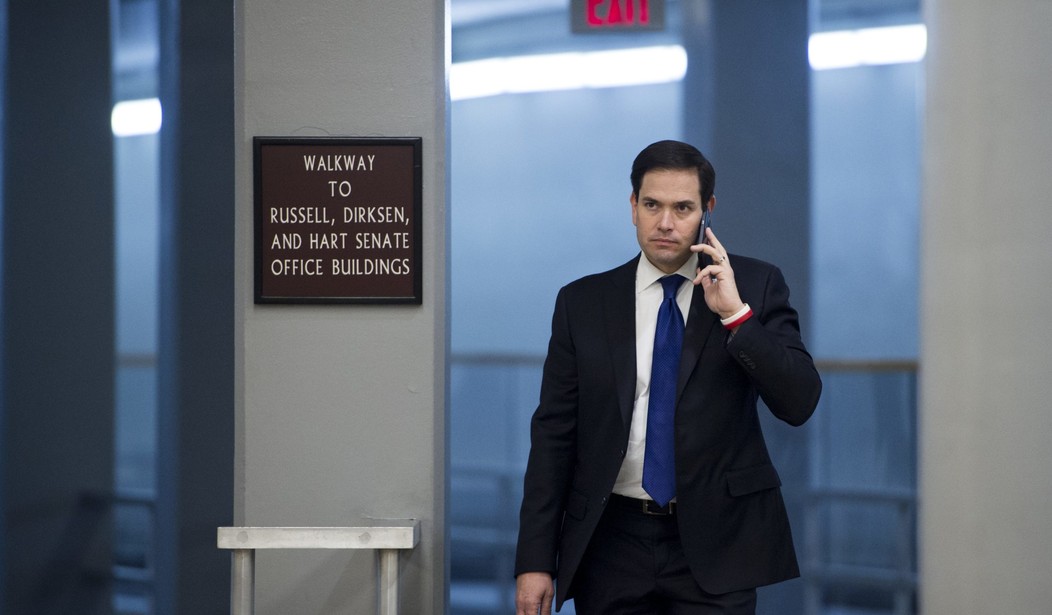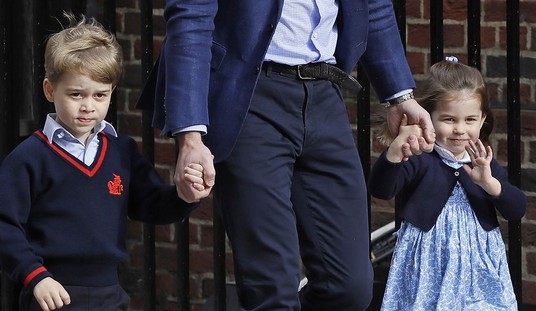WASHINGTON — Sen. Marco Rubio (R-Fla.) left the campaign trail in mid-March without a presidential nomination and without a Senate campaign, having ceded the chance at a second term for a shot at the White House.
Since then he has been hard at work in the upper chamber, quietly forging ahead with an aggressive human-rights agenda matching legislative action with issues ranging from Latin America to Saudi Arabia to the United Nations.
On April 6, Rubio introduced a bill with Sen. Mark Kirk (R-Ill.) to block indirect access by Iran to the U.S. financial system. On April 19, Rubio and Sen. Joe Manchin (D-W.Va.) introduced a resolution “expressing the sense of Congress that the United States should continue to exercise its veto in the United Nations Security Council on resolutions regarding the Israeli-Palestinian peace process” as “the human rights bodies and agencies of the United Nations, such as the United Nations Human Rights Council, have consistently demonstrated unwarranted bias against Israel.”
Last week, Rubio and Sen. Bob Menendez (D-N.J.) pushed to passage a three-year extension of sanctions under the Venezuela Defense of Human Rights and Civil Society Act of 2014. The bill targets government officials and others in the socialist regime who violate human rights and suppress dissent, as well as those who perpetrate violence against protesters.
“Because the Maduro regime continues to violate human rights and expand its political oppression, the U.S. must continue doing our part to address this growing crisis in Venezuela,” Rubio said in a statement Thursday. “There are numerous examples of why these sanctions need to remain in place for the foreseeable future, including Maduro’s abuse of Venezuela’s Supreme Court to nullify laws like the one to release scores of political prisoners.”
“The Maduro regime’s abuses of power and violations of human rights are hurting innocent people in our hemisphere and threaten the national security interests of the United States, and we have a responsibility to stand with the Venezuelan people by extending these sanctions.”
Rubio, a member of the Foreign Relations and Intelligence committees, put a high priority on global affairs in his quest for the presidency, reflecting his Senate experience. Since coming off the campaign trail March 15, he’s maintained a concerted focus on these core, signature issues.
Two days after leaving the campaign, he was speaking out for religious minorities targeted by ISIS — “that it took so long for the administration to arrive at this conclusion [of genocide], in the face of unspeakable human suffering, defies explanation” — and co-sponsored two bills to impose new sanctions on Iran for its ballistic missile program and “egregious human rights abuses.” He also voted for a bill to investigate sex trafficking on Backpage.com.
That first weekend after leaving the race, Rubio was ripping President Obama for his trip to Cuba. “He will visit Catholic Church sights and church officials, yet he’s inexplicably expected to skip St. Rita Church, where the Ladies In White have shed much blood and received routine beatings at the hands of the Castro regime for simply demanding their loved ones’ freedom,” Rubio said.
On March 22, the senator accepted the International Religious Freedom (IRF) Roundtable’s Thomas Jefferson International Religious Freedom Champion Award for his work on cases including that of Meriam Yahia Ibrahim, a Sudanese Christian woman who escaped the death penalty for apostasy after international outcry.
In early April, Rubio and Sen. Jeanne Shaheen (D-N.H.) pressured Secretary of State John Kerry and Treasury Secretary Jack Lew to implement their Hizballah International Financing Prevention Act of 2015 that was signed into law last year.
The bill, as they reminded Kerry and Lew, “provides for mandatory sanctions against foreign financial institutions and we urge you to aggressively utilize this authority to target the very financial institutions that allow Hizballah to transfer money for its nefarious activities.”
“We strongly urge you to designate a financial institution to send an important signal about our bipartisan resolve in countering Hizballah’s activities.”
Rubio has also backed the administration’s $1.9 billion funding request to combat the Zika virus, on the condition that money is only spent on programs directly linked to the mosquito-borne disease.
“While I heard many obstacles that we face in fighting Zika, one aspect I heard about repeatedly was the distressing length of time it takes for diagnostic tests to be completed. I have subsequently seen media reports of pregnant women who have waited up to a month for the CDC to complete their diagnostic tests for the Zika virus, while fearful mothers anxiously wait to know their child’s fate,” he wrote to Centers for Disease Control and Prevention director Dr. Tom Frieden on April 13. “This wait time is unacceptable.”
As Obama headed to Saudi Arabia in mid-April, Rubio and four bipartisan colleagues — Sens. Dick Durbin (D-Ill.), Jim Risch (R-Idaho), Pat Leahy (D-Vt.) and Ron Johnson (R-Wis.) — got together to urge the president “to advocate for the immediate and unconditional release of [blogger] Raif Badawi and [human-rights activist] Waleed Abu al-Khair.”
“We are concerned that unless you make these issues a priority during your trip, human rights abuses will continue to occur with impunity and the full potential of the U.S.-Saudi relationship will continue to be impeded,” the senators wrote.
Rubio joined a resolution with Foreign Relations Committee Ranking Member Ben Cardin (D-Md.) calling for a review of security assistance to Ethiopia after allegations of government killings of journalists, peaceful demonstrators and others.
“Peaceful protesters and activists have been arrested, tortured and killed in Ethiopia for simply exercising their basic rights,” Rubio said April 20. “I condemn these abuses and the Ethiopian government’s stunning disregard for the fundamental rights of the Ethiopian people. I urge the Obama administration to prioritize respect for human rights and political reforms in the U.S. relationship with Ethiopia.”
Rubio introduced a bill last week with Sens. Roy Blunt (R-Mo.) and John Cornyn (R-Texas) to bring the International Religious Freedom Act of 1998 up to date given current threats. It’s companion legislation to Rep. Chris Smith’s (R-N.J.) bill in the lower chamber.
“Religious freedom has rightly been called America’s first freedom and must be given priority in our foreign policy agenda. This legislation brings the historic International Religious Freedom Act into the 21st century by giving this administration and future administrations the tools needed to defend this most basic human right,” Rubio in a statement. “People of faith around the world routinely find themselves in the crosshairs, not only of repressive and authoritarian states, but also of non-state actors like ISIL and Boko Haram.”
“Wherever assaults on religious freedom occur, America has a moral responsibility to speak up and to act.”









Join the conversation as a VIP Member